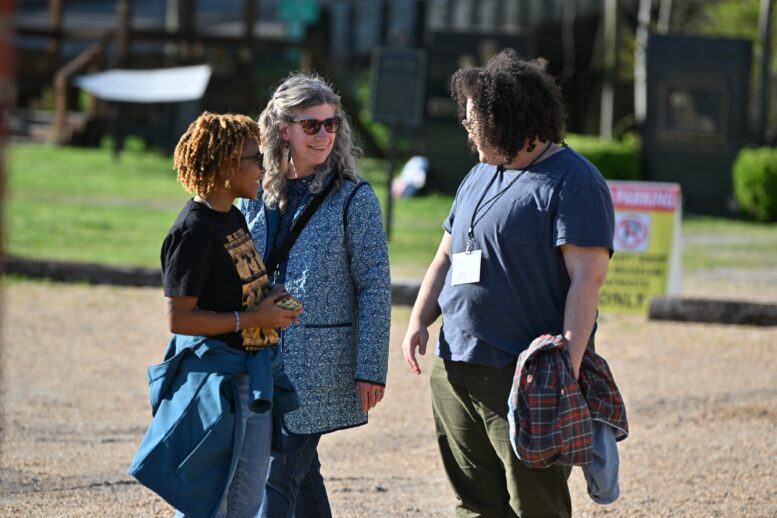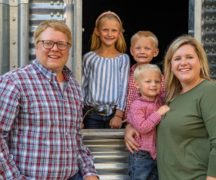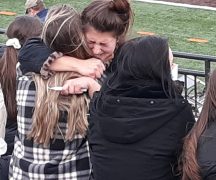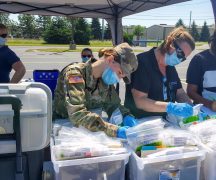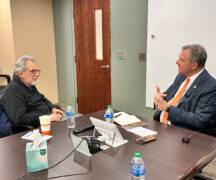By JULIE CARLE
BG Independent News
Denise Bostdorff remembers playing teacher to her younger brother and younger twin sisters when siblings were the closest playmates on their rural Bowling Green farm.
Reading and library visits with her mother Nancy and word games with her father Jim, now both deceased, filled her with a love of words and language.
As a teen, Bostdorff discovered success in 4-H public speaking competitions and was exposed to theater and speech at Otsego High School. With those foundations, she attended Bowling Green State University thinking she was going to be a speech teacher.
That trajectory changed when two faculty members introduced her to political communication and rhetorical criticism. She became intrigued with rhetoric, the persuasive use of language or other symbols.
“In rhetorical criticism events, I would analyze a speech or some other form of communication such as musical lyrics, films, newscasts and television,” she said, which taught her to understand the communication process and investigate the impact of public discourse.
“I learned a lot from both of them, and they encouraged me to go to graduate school,” which is how she landed in a higher education career, teaching communication and political rhetoric, first at Purdue University and for the past 30 years at The College of Wooster as a professor of communication studies.
Superlative teaching award
Teaching students beyond the lectures and engaging them in experiential learning has become her trademark. Her interactive teaching style and “superlative teaching of communication” also earned her the 2024 Donald H. Ecroyd Award for Outstanding Teaching in Higher Education from the National Communication Association (NCA).
She officially receives the award –the highest honor for college professors in the field–next week at the NCA annual meeting in New Orleans, Louisiana.
Joe Vardon, a College of Wooster graduate who is a senior national writer for “The Athletic” and one of Bostdorff’s nominators for the award wrote: “I credit Dr. Bostdorff’s teaching and guidance as the primary outside factor in the career path I have been so lucky to enjoy. She set my course.”
With an expertise in presidential rhetoric, “her magic is in deciphering concealed messages in written and spoken words,” Vardon continued. “As she taught so well, the trick is in the listening.”
When he was hired at the Plain Dealer to “report on everything LeBron” James, Vardon reached out to Bostdorff to help him study how James used rhetoric to lead younger Cleveland Cavaliers’ teammates.
“By this point in my career I had access to dozens of experts in sports and politics… I asked her because I was certain she was the best, most qualified person for the assignment,” he said.
Kirt Wilson, head of communication arts and sciences at Pennsylvania State University and another nominator for Bostdorff’s award, said graduate students at Purdue University knew she was “rigorous, creative and engaging.”
Though she was one of two faculty members who gave a two-and-a-half-hour comprehensive exam, “she was a popular instructor due to her innovative teaching methods,” Wilson wrote. She left the top-level research university to devote her career to teaching undergraduates at a small liberal arts college.
“Twenty-six years after I met her, she is still showing students their potential by treating them as though they have already reached it,” Wilson said. “She is still an expert in her field, a gladiator for her profession, and a believer in people.”
Teaching undergraduates became her focus
Bostdorff’s decision to leave Purdue for Wooster was fueled by a desire to teach undergraduates. She enjoyed teaching graduate students who were already focused on communication, but undergraduate students were “just kind of blank slates,” she said. “I feel like my teaching with undergrads has a farther reach. You can really see that step-by-step process with the students.”
Often at Wooster, she will have students in multiple classes “from the time they are first-year students to the time that they graduate and beyond,” she said.
They are often students who are interested in rhetoric even though they are planning to work in medicine, journalism, the nonprofit sector or business. “I want them to be aware of rhetoric regardless of what they plan to do,” Bostdorff said.
She is passionate about engaging students in the classroom. “I always tell people in rhetorical criticism that by the time this course is done, I will have ruined TV viewing for you because you will see things in messages that other people don’t see. It will drive you crazy but it’s going to be so cool,” she said.
Her courses are rarely just lectures, in part because she remembered being “bored out of my mind” with exclusively lecture classes. Instead, she combines some lecture with slides of images or video clips and lots of discussion, but also activities where people must apply what they are learning in class.
During her educational journey, Bostdorff saw first-hand excellent teachers–from Otsego High School and BGSU to her Ph.D. adviser at Purdue–who modeled engaged learning and care for their students.
She had the perspective of being an introverted student which “made me a better teacher because it made me a good listener and a close observer of others,” she said. “I was better able to read what a student was feeling or anticipate what they needed.”
Bostdorff said she “takes a sliver of being a first-generation college student” into her classroom and does her best “to meet students where they are. I look at students as if they’re not just academic beings. They’re whole people.”
She makes a concerted effort to watch them in the areas where they excel, whether as a college athlete or a violinist.
Bostdorff is also known for awesome experiential learning opportunities, whether part of a student’s senior capstone project at Wooster, known as the yearlong Independent Study, or a project off campus.
She is a proponent of instilling the notion of democratic citizenship, which she describes as, “Simply saying that all people should have a say in things that affect them, and anyone who is a part of our community should give back to that community to make it a better place” for others and themselves.
Her interest in engagement with teaching and learning comes from her family who was always very involved in the community from church and school activities to local government and 4-H. That background is one of the reasons she involves students in activities such as “Get Out the Vote” messaging, registering voters or teaching diversity, conflict resolution, and better communication skills to preschoolers.
“When our students had to apply what they were learning in the classroom to those sorts of endeavors, what they figured out was that they learn the concepts much better, and they also start to understand how complex everything is,” she said.

